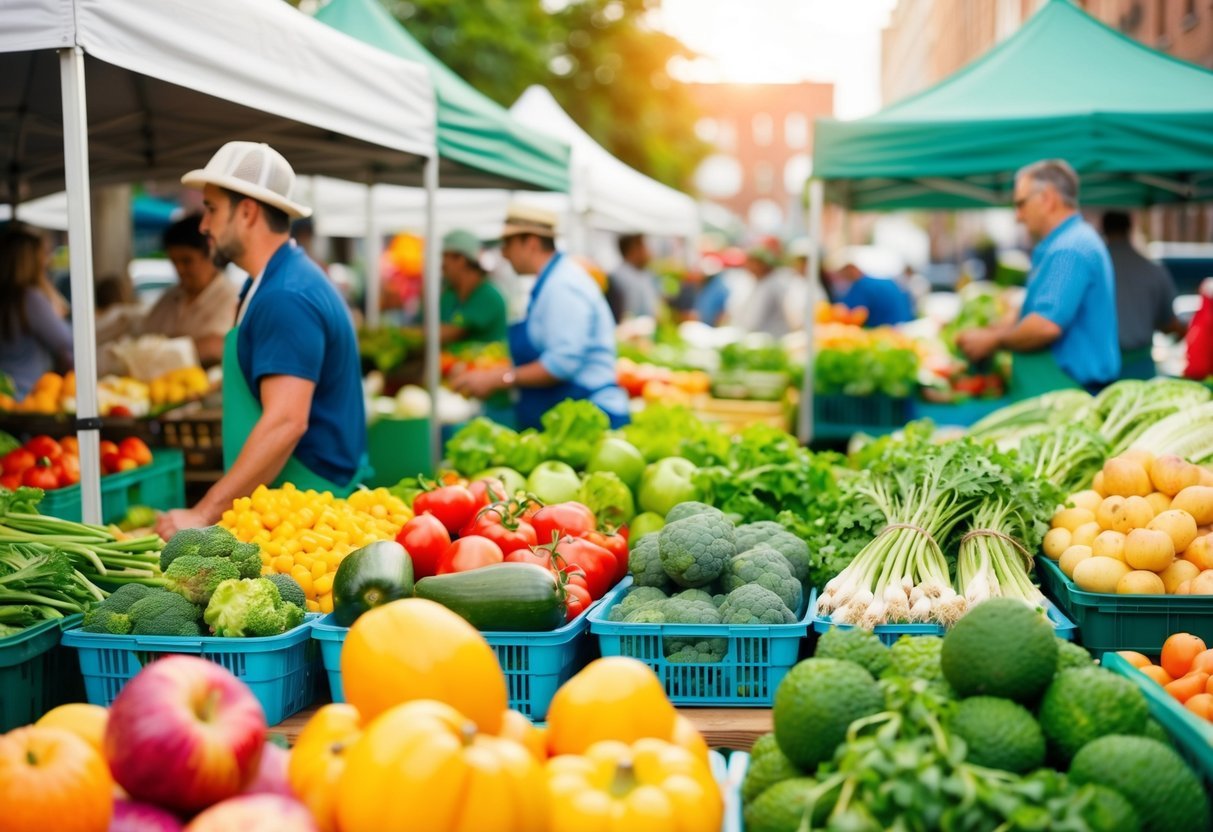Understanding Seasonal Eating
Seasonal eating focuses on consuming foods that are harvested at their peak times throughout the year.
This approach not only enhances the flavor of your meals but also boosts nutritional benefits.
By eating seasonally, you can enjoy a wider variety of fresh produce.
Defining Seasonal Eating
Seasonal eating means choosing fruits and vegetables that are grown and harvested during specific times of the year.
For example, tomatoes are typically in season during summer, while squash is more common in fall.
This practice encourages you to visit local farmers’ markets and grocery stores that feature fresh, local produce.
Eating seasonally typically means better taste and nutrition.
Foods that are in season are often harvested at their peak ripeness, which can enhance both flavor and nutrient content.
Seasonal produce is usually fresher and does not require long transportation, preserving vitamins and minerals.
Variety and Nutrition
A diet that includes seasonal produce offers a wide variety of nutrients essential for a balanced diet.
Each season brings a unique selection of fruits and vegetables, helping you access different vitamins and minerals.
Incorporating various seasonal foods can help reduce the risk of nutrient deficiencies.
Fresh ingredients often contain higher levels of vitamins compared to those stored for long periods.
Additionally, the diversity in produce allows for creative meal planning and flavorful dishes that keep your meals interesting and enjoyable.
Health and Nutritional Value
Eating seasonal foods boosts your health by providing a variety of essential vitamins and minerals.
These nutrients are vital for maintaining a strong immune system and overall well-being.
Seasonal produce is often more nutrient-dense, offering better quality and flavor.
Vitamins and Minerals in Seasonal Foods
Seasonal foods are packed with vitamins and minerals that support your health.
For example, fruits and vegetables harvested during their peak season contain higher concentrations of nutrients.
- Vitamin C: Common in citrus fruits and leafy greens, this vitamin helps boost your immune system.
- Vitamin A: Found in carrots and sweet potatoes, it supports vision and skin health.
- Potassium: Present in bananas and tomatoes, it is essential for heart health.
Eating these nutrient-rich foods regularly can help improve your nutrient intake and keep your body functioning at its best.
Antioxidants and Immunity Support
Seasonal foods are also rich in antioxidants, which play a crucial role in protecting your body.
These compounds help fight free radicals, reducing oxidative stress.
- Berries: Strawberries, blueberries, and blackberries are high in antioxidants that support your immune system.
- Leafy Greens: Spinach and kale provide not only vitamins but also powerful antioxidants that combat inflammation.
By including seasonal fruits and vegetables in your diet, you enhance your body’s defense against illnesses and promote overall health.
Environmental and Economic Impact
Eating seasonal foods not only boosts your health but also has significant effects on the environment and local economies.
By choosing local and seasonal produce, you contribute to sustainability and support local farmers, which helps create a more resilient food system.
Sustainability and Food Miles
Seasonal eating reduces food miles, which is the distance food travels from the farm to your plate.
When you select local produce, you lower your carbon footprint and decrease greenhouse gas emissions associated with transportation.
Local foods often require less packaging and processing, making them a greener choice.
This commitment to seasonal eating also promotes mindful choices.
Fewer food miles mean better use of natural resources and less environmental impact, aligning your diet with a sustainable lifestyle.
Supporting Local Economies through Farmers Markets
Farmers markets play a vital role in supporting local economies.
By purchasing from these markets, you directly contribute to local agriculture and provide farmers with fair compensation.
This financial support helps maintain and grow local farms, fostering a healthy community.
Buying seasonal produce at farmers markets not only yields fresher options but also stimulates local economies.
This approach encourages consumers to make informed choices that benefit the environment.
As you participate in these markets, you’re not just making a purchase; you’re investing in the future of your community and natural resources.
Community and Cultural Benefits

Seasonal eating offers significant benefits not just for personal health but also for communities and cultural practices.
Engaging with local food systems enhances your connection to food and fosters richer culinary experiences.
Community-Supported Agriculture
Community-supported agriculture (CSA) connects you directly with local farmers.
By joining a CSA, you receive fresh fruits and vegetables throughout the growing season.
This system provides a steady supply of produce and increased income for local farmers.
Participating in a CSA promotes a sense of community.
You can share recipes, tips, and cooking ideas with fellow members.
This sharing fosters a stronger bond and encourages you to explore different and seasonal ingredients.
Culinary Creativity and Taste Education
Eating seasonal food sparks culinary creativity.
With fresh ingredients on hand, you can try new recipes that highlight the flavors of the season.
Seasonal produce often tastes better because farmers harvest it at the peak of ripeness.
Seasonal eating also opens the door to educational opportunities.
You learn about the various fruits and vegetables available in your area.
This knowledge helps you appreciate where your food comes from and its role in a varied diet.
You can even grow your own produce, further connecting you with the food you eat.
This hands-on experience enriches your culinary skills and deepens your understanding of local food cultures.

